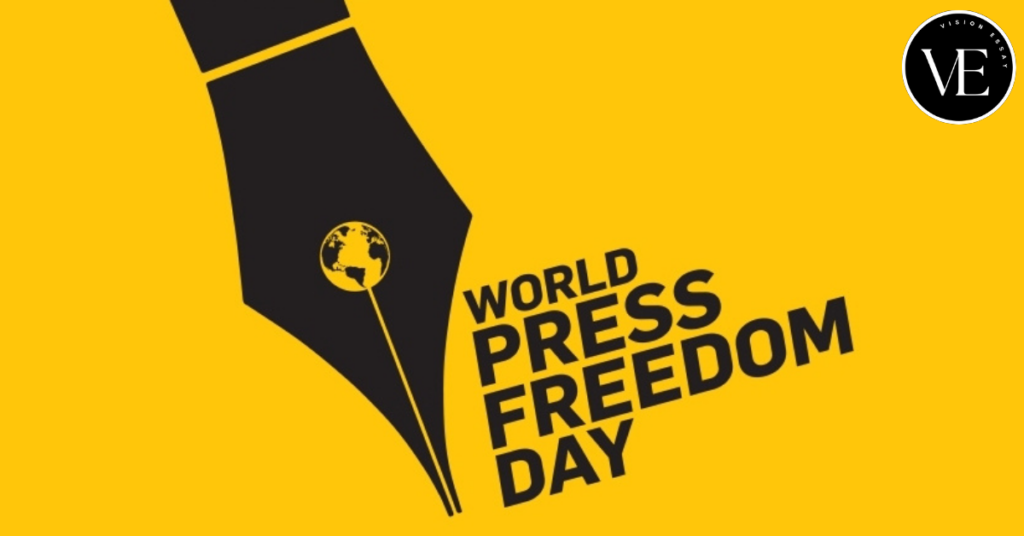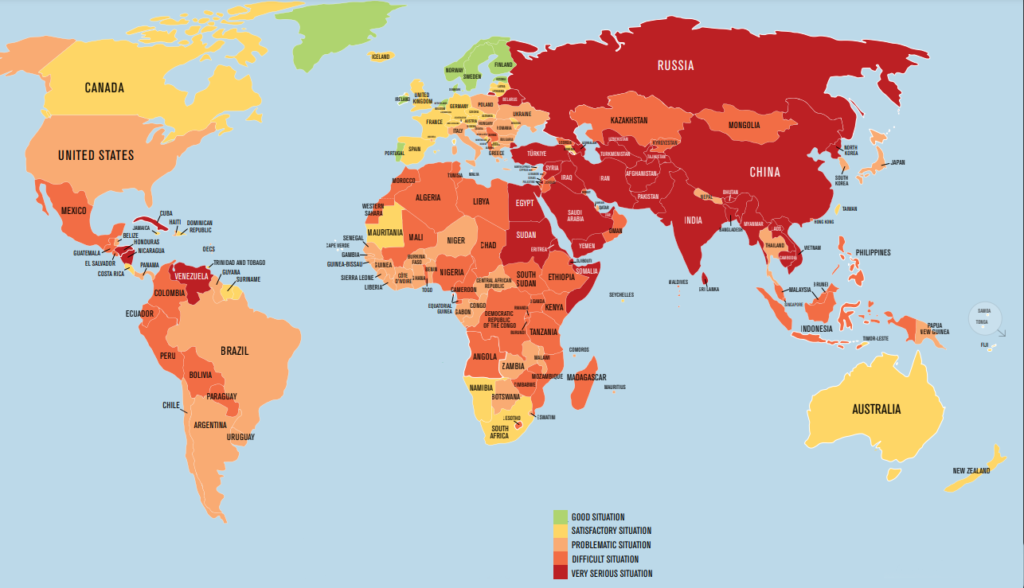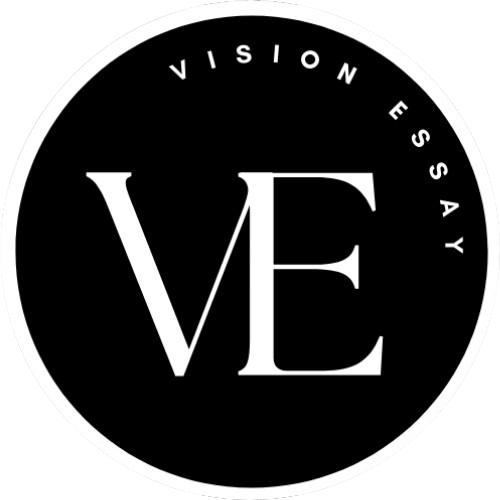
Introduction
Every year on May 3rd, the world observes World Press Freedom Day, a day devoted to promoting press freedom awareness and recognizing journalists who put their lives in danger to provide the public with information. It acts as a reminder of the core values of supporting media independence, promoting press freedom, and ensuring the safety of journalists.
The United Nations Educational, Scientific, and Cultural Organization (UNESCO) issued a new study on May 3, 2024, World Press Freedom Day, which highlights an increase in violence against environmental journalists globally.
What is the World Press Freedom Index?
- Reporters Without Borders, a non-profit that promotes press freedom and journalists’ rights globally, publishes the World Press Freedom Index each year. The index assigns a ranking to nations according to their degree of press freedom, accounting for elements including media autonomy, openness, diversity, the legal framework, and journalist safety.
- The index offers a thorough assessment of press freedom conditions throughout the world and may be used to track developments and pinpoint regions where press freedom is in jeopardy. Additionally, it seeks to advocate for the safety of media professionals and journalists, as well as to increase awareness of the value of a free and independent press in a democratic society.
- Various factors are used to award scores and rankings to countries; lower scores correspond to more freedom of the press, while higher ranks indicate an overall better working environment for journalists. Policymakers, journalists, human rights campaigners, and the general public frequently use the World Press Freedom Index as a gauge of press freedom worldwide.
What is the History of World Press Freedom Day?
In 1993, the United Nations General Assembly declared World Press Freedom Day by a suggestion made during the 26th UNESCO General Conference in 1991. The Windhoek Declaration, a 1991 declaration of press freedom principles proposed by African journalists in Namibia, is commemorated on May 3rd.
- UNESCO Declaration: At the 1991 General Conference of the United Nations Educational, Scientific, and Cultural Organization (UNESCO), the concept of a day honoring press freedom was first put out. The Windhoek Declaration, which demanded the creation of an autonomous and diverse African press, was adopted during this meeting. May 3rd has been designated as World Press Freedom Day by UNESCO in honor of this proclamation and its significance for press freedom across the world.
- First Celebration: On May 3, 1993, the inaugural World Press Freedom Day was commemorated. Since then, it has been observed yearly on a global scale with a range of activities, such as conferences, seminars, workshops, and campaigns to uphold and advance press freedom.
- Themes: Every year, UNESCO selects a subject for World Press Freedom Day celebrations that emphasize various facets of press freedom and freedom of speech. These subjects frequently mirror the difficulties that media outlets and journalists throughout the world are currently facing. For instance, “Information as a Public Good” and “Media for Democracy: Journalism and Elections in Times of Disinformation” are two contemporary themes.
- Advocacy and Awareness: On World Press Freedom Day, we have the chance to promote press freedom and highlight the value of independent, free media in democracies. It gives the public, media professionals, human rights advocates, lawmakers, and journalists a forum to discuss important problems about press freedom and to take action to protect and uphold it.
What is the Importance of Press Freedom?
- Democracy and Accountability: A free press keeps an eye on government agencies and holds them responsible to the people. It gives people the knowledge they need to engage in democratic processes, make educated decisions, and hold their leaders responsible for their deeds.
- Freedom of Expression: A key component of freedom of speech, which is a human right acknowledged by international law, is press freedom. It enables people to engage in public discourse, exchange information, and voice their thoughts without worrying about retaliation or censorship.
- Pluralism and Diversity: A pluralistic and diversified media environment, where a range of voices, viewpoints, and ideas are heard, is fostered by a free press. This diversity contributes to a more meaningful public conversation, fosters tolerance and understanding, and slows the spread of propaganda and false information.
- Transparency and Information Access: Freedom of the press guarantees that knowledge regarding public policies, social concerns, and government actions can circulate freely throughout society. Promoting openness, combating corruption, and enabling people to make educated decisions about their lives and communities all depend on having access to information.
- Human Rights and Rule of Law: The freedom of the press is intimately related to other human rights, such as the right to privacy, the right to a fair trial, and the right to freedom of association. By drawing attention to violations of human rights, exposing injustice, and providing voice to underrepresented and vulnerable groups, a free press contributes to the protection of these rights.
- Economic Development: Due to its ability to foster an atmosphere that encourages entrepreneurship, investment, and invention, press freedom is also crucial for economic growth. By giving customers, firms, and investors accurate information, a free press encourages market accountability and openness and contributes to economic success.
Also read: Freedom of Press in India in 2023
What are the Challenges Faced by the Press?
- Censorship: Media censorship rules and limitations can be enforced by governments and other agencies, restricting the scope of stories and publications that journalists can cover. This might involve more covert methods of control including legal retaliation or financial coercion, as well as overt suppression of particular subjects.
- Violence and Harassment: Journalists frequently experience physical assault, intimidation, and harassment from both state and non-state entities, including political parties, criminal organizations, and influential people. Threats and harassment kidnapping, assault, and even murder are examples of this kind of violence.
- Legal Restrictions: Restrictive rules and regulations, such as those about national security, anti-terrorism, or defamation, can limit the freedom of the press and be used to penalize or suppress journalists for their reporting or to quiet dissident voices.
- Economic Pressures: Numerous media companies are facing financial difficulties, such as dwindling advertising-income, competition from digital platforms, and owner or advertiser financial pressure. These financial constraints may undermine journalistic independence and restrict their capacity to cover stories that are critical or investigative.
- Lack of Access to Information: In certain nations, physical hurdles, bureaucratic roadblocks, or official secrecy may make it difficult for journalists to obtain information. It is challenging for journalists to hold individuals in positions of authority responsible and to give the public accurate, thorough reporting because of this lack of openness.
What is Press Freedom Around the World?
- India
- According to the degree of freedom provided to journalists, the World Press Freedom Index ranks various nations and geographic areas.
- Since 2002, it has been released annually by Reporters Without Borders.
- Five contextual indicators—political context, legal system, economic environment, sociocultural context, and safety—are used to assess any nation or territory’s score.
- India received a score of 36.62 out of 100 in 2023, placing it 161st out of 180 nations. India was ranked 150 in 2022.
- Among 180 nations, India’s ranking has improved little from 161 in 2023 to 159 in 2024.
- India’s score fell, from 36.62 to 31.28, and scores fell in every category save the security indicator, despite this upward change in the ranking.
- Global Score
- Norway, Denmark, and Sweden have the top three positions in the 2024 study, respectively. On the list, Syria came in barely ahead of Eritrea at the bottom.

Conclusion
World Press Freedom Day 2024 underscores the critical role of press freedom in safeguarding democracy and human rights. Despite global efforts, the new UNESCO study highlights escalating violence against environmental journalists. The World Press Freedom Index serves as a vital tool for monitoring press freedom globally. Challenges persist, including censorship, violence, legal constraints, and economic pressures. Continuous advocacy and awareness are imperative for upholding press freedom worldwide.
Frequently Asked Questions(FAQs)
What is the significance of World Press Freedom Day?
World Press Freedom Day raises awareness of the importance of press freedom and honors journalists who risk their lives to bring information to the public.
What is the theme of World Press Freedom Day 2024?
World Press Freedom Day (2024) honors the value of free speech and journalism in light of the present environmental disaster facing the entire world. For democratic societies to be built, all facets of the global environmental issue and its effects must be understood.
Who is hosting the World Press Freedom Day?
The 31st World Press Freedom Day Conference will be held in Santiago, Chile, from May 2–4, sponsored by UNESCO and the Chilean government.
How does press freedom impact democracy?
Press freedom is essential for democracy as it allows journalists to hold governments and powerful entities accountable, facilitate informed public discourse, and safeguard human rights.
Sources:
- https://www.unesco.org/en/days/press-freedom
- https://www.un.org/en/observances/press-freedom-day
- https://www.whitehouse.gov/briefing-room/statements-releases/2024/05/03/statement-by-president-joe-biden-on-the-occasion-of-world-press-freedom-day-2024/
- https://en.wikipedia.org/wiki/World_Press_Freedom_Day
- https://indianexpress.com/article/when-is/world-press-freedom-day-2024-know-the-date-theme-origin-and-significance-9298973/
- https://pib.gov.in/PressNoteDetails.aspx?NoteId=151884&ModuleId=3
